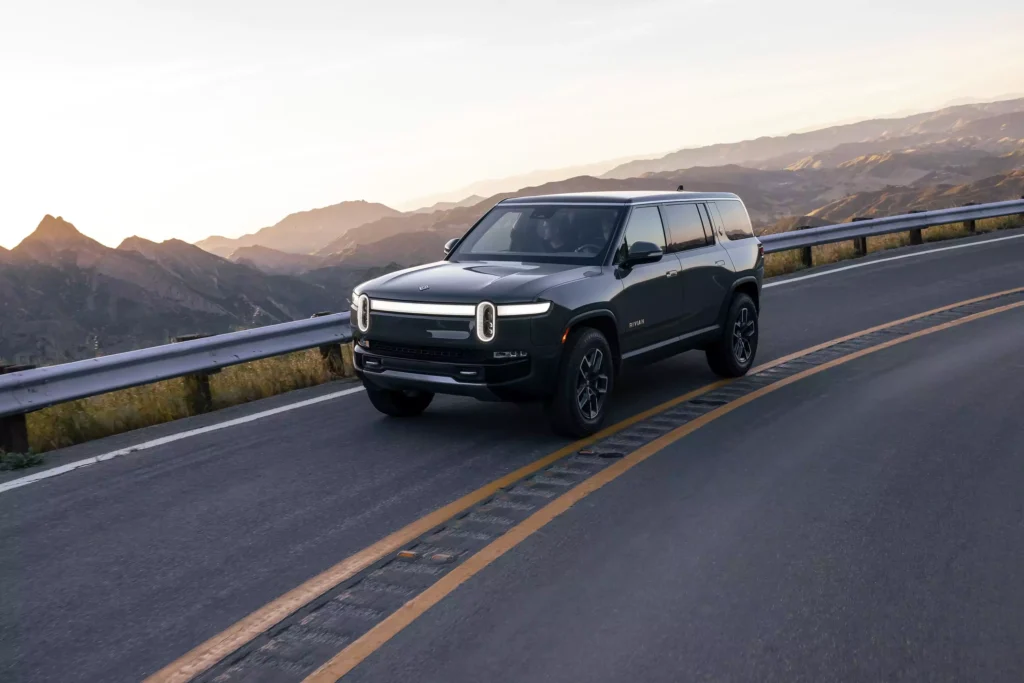Rivian, a trailblazing force in the automotive industry, has been generating significant buzz with its groundbreaking electric trucks. As consumers eagerly anticipate the arrival of these electric vehicles (EVs), the question arises: Who makes Rivian trucks? In this comprehensive article, we will delve into the origins, vision, and key players behind Rivian, the company at the forefront of the electric revolution in the automotive sector.

The Rise of Rivian:
Founded in 2009 by Robert “RJ” Scaringe, Rivian is an American automotive company with a mission to revolutionize the way people think about transportation. The company’s vision is centered on sustainable mobility, and its foray into the electric vehicle market aims to redefine the automotive landscape.
Founding Vision and Mission:
Rivian‘s founder, RJ Scaringe, envisioned a future where vehicles seamlessly integrate with the environment, providing innovative solutions to transportation challenges. The mission of Rivian goes beyond producing electric trucks; it involves creating a comprehensive ecosystem that embraces sustainability, adventure, and cutting-edge technology.
Key Players and Leadership:
RJ Scaringe’s leadership has been instrumental in shaping Rivian’s trajectory, and the company has attracted a diverse and talented team of professionals from various industries. The leadership at Rivian brings a wealth of experience and expertise, contributing to the company’s success in pushing the boundaries of electric vehicle technology.
1. RJ Scaringe (Founder and CEO):
RJ Scaringe, a mechanical engineer with a Ph.D. from MIT, founded Rivian with a vision to develop sustainable transportation solutions. As the CEO, he has been the driving force behind Rivian’s commitment to innovation, sustainability, and the pursuit of excellence in electric vehicle design.
2. Leadership Team:
Rivian’s leadership team includes individuals with backgrounds in automotive engineering, technology, and business. The team’s collective expertise has been crucial in navigating the complex challenges of the automotive industry and establishing Rivian as a prominent player in the electric vehicle market.
Innovations in Electric Truck Design:
Rivian’s foray into electric trucks has been marked by groundbreaking innovations in design, technology, and performance. The company’s R1T pickup truck and R1S SUV have garnered attention for their impressive features, including:
1. All-Electric Platform:
Rivian vehicles are built on an all-electric platform, emphasizing the company’s commitment to sustainability. The electric drivetrain delivers high-performance capabilities while minimizing environmental impact.
2. Long Range:
Rivian trucks are designed to offer an extended range on a single charge. The company’s focus on battery technology has resulted in vehicles capable of covering significant distances, addressing one of the key concerns associated with electric vehicles.
3. Adventure-Focused Design:
Rivian vehicles are tailored for adventure enthusiasts, featuring robust off-road capabilities and durable designs. The R1T and R1S are engineered to handle challenging terrains, making them suitable for both urban and off-road adventures.
4. Amazon Partnership:
Rivian’s strategic partnership with Amazon has played a pivotal role in the company’s growth. In 2019, Amazon ordered 100,000 electric delivery vans from Rivian, showcasing the company’s potential to make a significant impact beyond consumer vehicles.
Production Facilities:
To bring its electric vehicles to market, Rivian has invested in state-of-the-art production facilities. The company has repurposed and transformed existing manufacturing plants to accommodate the unique requirements of electric vehicle production.
1. Normal, Illinois Facility:
Rivian’s primary production facility is located in Normal, Illinois. The facility, known as the Rivian Normal plant, was acquired from Mitsubishi Motors and has been extensively renovated to meet the production needs of the R1T and R1S vehicles.
2. Global Expansion:
In addition to its Illinois facility, Rivian has outlined plans for global expansion. The company has expressed intentions to establish production facilities in other regions, catering to the growing demand for electric vehicles on a global scale.
Investor Support and Financial Backing:
Rivian’s journey has been buoyed by substantial financial support from a diverse group of investors. The company’s ability to attract funding reflects confidence in its vision, leadership, and the potential of electric vehicles in the automotive market.
1. Major Funding Rounds:
Rivian has successfully completed several funding rounds, raising billions of dollars from investors. Notable investors include Amazon, Ford, and various venture capital firms. These investments have been instrumental in funding research and development, production infrastructure, and market expansion.
2. IPO Speculations:
As of the last available information, Rivian has been the subject of speculation regarding a potential initial public offering (IPO). Going public could provide Rivian with additional capital to further its growth and solidify its position in the electric vehicle market.
Challenges and Future Outlook:
While Rivian has achieved significant milestones, it faces challenges common to the automotive industry, including production scalability, supply chain management, and market competition. The company’s ability to navigate these challenges will influence its future success and impact on the electric vehicle landscape.
1. Production Scaling:
As Rivian moves from initial production to meeting broader market demands, scaling up production efficiently will be a critical challenge. The company’s success in overcoming production challenges will determine its ability to deliver vehicles on schedule and satisfy customer expectations.
2. Market Competition:
The electric vehicle market is becoming increasingly competitive, with established automakers and new entrants vying for market share. Rivian’s unique focus on adventure-centric electric trucks positions it uniquely, but sustained success will depend on effectively differentiating itself in a crowded market.
3. Consumer Adoption:
While there is growing interest in electric vehicles, consumer adoption is influenced by factors such as charging infrastructure, cost, and range anxiety. Rivian’s ability to address these concerns and educate consumers about the benefits of electric trucks will play a role in its market success.
Conclusion:
Rivian, the company behind the innovative electric trucks R1T and R1S, has emerged as a significant player in the automotive industry. With a visionary founder, a strong leadership team, and strategic partnerships, Rivian is poised to make a lasting impact on the electric vehicle market. As the company navigates challenges and continues to innovate, its success will not only shape the future of electric trucks but also contribute to the broader evolution of sustainable transportation.
Also read: How to Start a Pilot Car Business